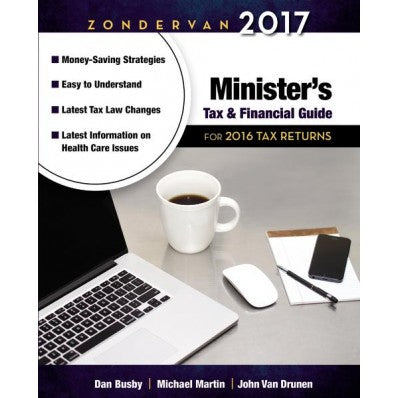by Dan Busby, Michael Martin, and John Van Drunen, adapted from their new book Zondervan 2017 Minister’s Tax & Financial Guide (For 2016 Tax Returns).
Ministers continue to be faced with a plethora of tax and finance developments. A summary of some of the more significant developments are listed below. Pick up the new book if you’re looking for a one-stop resource to help you navigate tax and finance issues and file your 2016 taxes.
- Changes coming for Social Security in 2017. Here are some of the key changes coming from the Social Security Administration (SSA) for 2017:
The full retirement age (FRA) is increasing for new retirees. It has been over three decades since Congress passed legislation to alter the full retirement age—the age at which you become eligible for 100% of your monthly benefit. Beginning in 2017, the FRA is slated to increase by two months for those born in 1955, to 66 years and 2 months.
Seniors who file for benefits prior to reaching their full retirement age are subject to having some, or all, of their benefits withheld by the SSA if they earn too much. In 2016, early filers who had not reached their FRA, and would not do so during the year, would have $1 in benefits withheld for each $2 in earned income over $15,720. For persons hitting their FRA during 2016, but who had not yet done so when they filed, $1 in benefits could be withheld for each $3 in earned income above $41,880. These thresholds have been pushed up to $16,920 and $44,880, respectively for 2017.
- New overtime regulations to potentially impact thousands of nonprofit employees. The U.S. Department of Labor has announced its update to the Fair Labor Standards Act (FLSA).
With no specific exemption for nonprofits that employ millions of Americans, the new rules will have a significant impact on the finances and human resources of churches and ministries throughout the United States.
In a major shift, all workers earning less than $47,476 per year ($913/week) are now generally eligible for overtime pay—just over double the previous threshold. The revised rules became effective December 1, 2016. If not already done, ministries should consider important issues that may be impacted such as staffing budgets, work schedules, job responsibilities and descriptions, and employee handbooks.
Ministers, as well as those carrying out similar ministerial roles, within churches and religious organizations may be exempt from the FLSA rules, under the ministerial exception. While this exception does not have a clear definition, it was recognized by the U.S. Supreme Court in the Hosanna Tabor v. EEOC case. It is recommended that organizations consult their legal counsel regarding the specific application of this exception.
- Changes coming soon to presentation standards for Not-for-Profit Financial Statements. The Financial Accounting Standards Board (FASB) has just announced the first major changes in over 20 years to its standards governing financial statement presentation by not-for-profits, including churches and ministries.
The stated goal: improving the standards “to provide better information to donors, grantors, creditors, and other users of financial statements.”
Amendments to the standards are focused on four key areas: (1) net asset classification, (2) information about liquidity and availability of resources, (3) information about expenses and investment return, and (4) presentation of operating cash flows.
The changes become effective for Generally Accepted Accounting Principles (GAAP)- prepared financial statements for fiscal years beginning after December 15, 2017, and for interim periods within fiscal years beginning after December 15, 2018. See FASB In Focus – Not-for-Profit Entities (Topic 958) released August 18, 2016, for more details.
— Dan Busby, Michael Martin, and John Van Drunen, Zondervan 2017 Minister’s Tax & Financial Guide. Learn more about recent developments and what steps you need to take in this new book.
How to Use This Book
This is a one-stop resource for answers to the tax and finance issues most frequently asked by ministers and churches.
“By simplifying complex tax issues, you are freed to more clearly focus on fulfilling the Great Commission,” write the authors. That’s why their goal is “to help you minimize taxes while, at the same time,
This guide includes the basic rules for:
- ministerial income taxes
- determining social security tax liability
- accountable expense reimbursement plans
- housing allowance issues
- much more
“It is our prayer that the practical information and tips included in this guide will be useful to you as a minister in eliminating confusion about some of the most common tax questions and in leveraging your compensation to yield the best possible stewardship outcome,” write the authors. If you have tax questions get their guide today.

